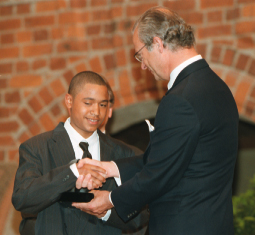|
|
|
|
|
Translated article published in Stockholm's Daily Newspaer, Svenska Dagbladet
Now, three years later, he is here in Stockholm together with Richard and three other representatives from HarlemLive. In competition with nearly 50 projects from the whole world, the team yesterday, Wednesday, accepted first prize in the category "culture and media" in the global Bange-mann Challenge. "People didn't believe us when we said that we were going to Sweden," say the teenagers in unison. "I was forced to show my airplane tickets in school to prove that I wasn't just trying to ditch," says Angel. David Farber, self-proclaimed "grandfather of the Internet," has said that while the business community discusses how the Internet can be used, real decisions are taken on the grassroots level. He might as well have been referring directly to HarlemLive. In three years the Web publication has grown to involve over 45 students. A computer center on Fifth Avenue, Playing 2 Win, in New York houses the editorial office with around ten computers. The Web site includes features, interviews, pictures, event recommendations and a debate forum. At the moment many users are venting their opinions on the N.Y. police officers who fired 41 gunshots at the unarmed immigrant Amadou Diallo. "I used to always sit around and watch TV," says 16-year-old assistant editor Jerlena Rhodes. "But I don't have time for that anymore." Sixteen-year-old Khalid Muhammad is the group's technician. Osakwe Beale is 17 and responsible for PR, at least on this trip. "I'm good at things like that, such as addressing the press," he says, spoken as a true press spokesman. Open six days a week, various members of the group go to the HarlemLive office after school or Saturdays and stay there as long as their parents allow them to. The idea behind HarlemLive is to teach young people how to communicate with others, says the founder Richard Calton. "People say that computer users become introverted," he says, "but through the activities of producing the publication, they come out and meet people all over the place." In addition to this, seven or eight "adult" advisors hold courses in Web production, writing and digital photo-processing. Computer literacy is only one of the terms that the 100 to 200 young adults who have worked at the paper can use to describe themselves. Sure, HarlemLive has caught a few trouble-makers who would otherwise have ended up on the street, and it's apparent that many of the youngsters are used to being portrayed as "saved," but they are quick to explain that they would have managed even without HarlemLive. For Angel and the others, the publication has an additional responsibility: to improve Harlem's, according to them, inaccurately poor reputation. It is not a breeding ground for drug abuse and violent crime.
To start working at HarlemLive, applicants must, after an interview, be approved by one of the members of the senior editorial staff. About 15 people apply each month. "Before we started with this (application process) we were getting too many people who weren't devoted," Osakwe Beale explains. "It's easier if we, from the start, take in only those who are really interested." Everyone, including the adult advisors and director Calton, works voluntarily. It is up to each individual to decide how much time he or she wants to devote to the paper. The former grade-school teacher Richard Calton gives the impression of a character invented for a movie script. When he taught kids at Public School 206 he became increasingly engaged in the social situation of his young students. He supported them outside of school and even visited their homes. The villain in the inspirational saga was the school's principal who felt that teachers should not be engaged with students outside of school time. "I could get sued if something happens," she said, Richard Calton recalls. Richard Calton took the consequences of his commitment in order to continue to meet his students. He resigned from his position. Today, he works for the New York City Board of Education at Community School District Four in East Harlem, developing computer skills in the schools. After work he goes to HarlemLive. Resources have been a steady problem. In order to afford the trip to Stockholm, they had to rely on fund-raising, sponsorships and donations. This is similar to how the rest of the operation has been run. But now Richard Calton is hoping to gain a grant of around 280,000 crowns ($40,000) to, among other things, employ a staff person who would write down the concept for other teachers to read and formally train the adult advisors. "This has been managed from the heart. I just hope the money - if we get the grant - doesn't ruin anything," jokes Richard Calton with a serious undertone. |
|| Home Page | Welcome | Contents | Staff ||
Back to the top

 "They
have started to build new buildings in the middle of Harlem and they
are restoring burnt-out buildings," says Jerlena. "And we've got a Starbucks
now," she adds, referring to the Seattle-based coffee chain which has
spread throughout the U.S. "That would not have been possible ten years
ago," says Osakwe.
"They
have started to build new buildings in the middle of Harlem and they
are restoring burnt-out buildings," says Jerlena. "And we've got a Starbucks
now," she adds, referring to the Seattle-based coffee chain which has
spread throughout the U.S. "That would not have been possible ten years
ago," says Osakwe.